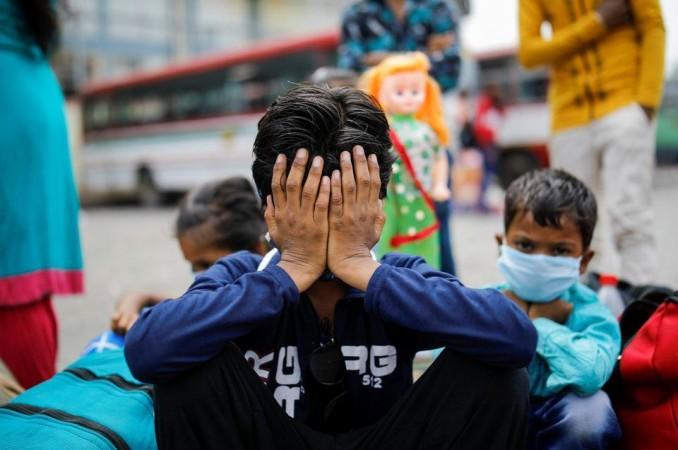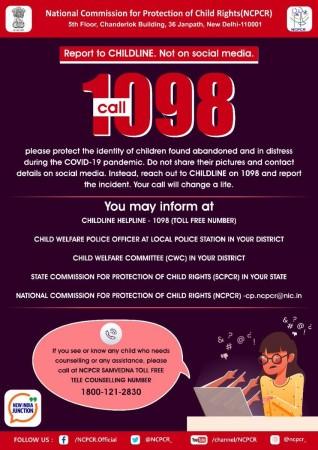On Monday, May 24, the National Commission For Protection of Child Rights (NCPCR) in the wake of the ongoing pandemic appealed to the public to protect the identity of children found abandoned, orphaned, or in distress during the COVID-19 pandemic situation in India.
In the posters broadcasted by NCPCR on its social media handle on Twitter, the appeal clearly reiterates 'Report to Childline. Not on social media' along with other Dos and Don'ts. This includes a strict prohibition on revealing a child's identity (name and photo) on social media, clicking and circulating pictures and revealing the child's location on social media messages.
If a distressed child is found, the matter should be immediately reported to the Childline Helpline 1098, Child welfare police officer at the local police station, district-specific child welfare committee, state commission for protection of child rights or national commission for protection of child rights.

Recently, India has found itself in the middle of an orphan crisis triggered by the pandemic with several children having lost both parents to the second wave of Covid-19. According to Aljazeera, "Thousands of children have lost one or both parents in the new pandemic wave ravaging India, where there were already millions of orphans. The prospect of a surge of abandoned minors worries many."
As quoted by the same news media, UNICEF India's chief Yasmin Haque said, "Such children are not only living an emotional tragedy, they are at high risk of neglect, abuse and exploitation."
Early May, netizens saw a surge in social media posts that put up pictures of orphaned children and illegal participation in online adoptions.
A report published by The Hindu last week suggests that authorities have taken notice of such malpractices and measures are being taken to avoid such occurrences.
"Taking serious note of the matter, the Department of Women and Child Development has adopted a slew of measures to create awareness, including a social media campaign, against falling prey to what is being regarded as illegal adoptions. A comprehensive webinar on legal adoption by an expert was also organized."

T.V. Anupama, director of the department told the newspaper, "We had a system to track and bring all orphaned children under the ambit of the Child Welfare Committee (CWC). Realising that the pandemic and the resultant lockdown disrupted that system, we have instituted a WhatsApp-based helpline to report children orphaned by the pandemic, while we have also given specialised training to our child protection officers to handle the new challenge."
On May 6, India Today reported that the ministry for women and child development (MWCD) has asked the ministry of health and family welfare to add a column in hospital admission forms asking patients to specify a caretaker/ guardian for their children in case of a death.
SN Srivastava, Police Commissioner, Delhi told News18 in a recent article, "It is a criminal offence to take custody of an orphaned child like this and the said person can be charged under IPC 363 (punishment for kidnapping)."
The News18 article furthers, "According to section 2(14) of the Juvenile Justice Act, 2015, any child who has lost both parents is deemed to be eligible for care and protection. This is where the WCD ministry, which works in close coordination with the National Commission For Protection of Child Rights (NCPCR) comes in. The ministry has started a helpline, 1098, and sources say the number of calls is increasing exponentially. But tracking, cross-checking with local police takes time, and in some cases, it may be too late. According to UNICEF, India has over 30 million orphaned and abandoned children. And while it's tough to get an estimate on the number of Covid orphans, sources say it could be as high as above 20,000. The problem is particularly acute in rural areas where such figures are often not even documented and where the ministry is worried it could give rise to trafficking, especially of girls."
Recently, during an interview with India Today, Priyank Kanoongo, chairperson, National Commission for Protection of Child Rights revealed, "Every police station in the country has a designated child welfare officer who will also help in making the social investigation. Section 31 of the JJ Act mandates the entire process is to be followed with the consent of the District Child Welfare Committee. There is a statutory mechanism in place and my appeal to all citizens is to inform the police and not do anything on their own. The NCPCR has also raised the red flag nationwide on this issue and I have written to chief secretaries of all states and Union territories underlining the due process to be followed in such cases under the provisions of the JJ Act."










!['Lip lock, pressure, pyaar': Vidya Balan- Pratik Gandhi shine in non-judgmental infidelity romcom Do Aur Do Pyaar [ Review]](https://data1.ibtimes.co.in/en/full/797104/lip-lock-pressure-pyaar-vidya-balan-pratik-gandhi-shine-non-judgmental-infidelity-romcom.jpg?w=220&h=138)






